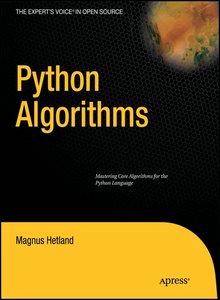Python Algorithms : Mastering Basic Algorithms in the Python Lang
Magnus, Lie Hetland
Éditeur : APRESS
ISBN papier: 9781430232377
Parution : 2010
Code produit : 1134760
Catégorisation :
Livres /
Science /
Mathématique /
Mathématiques
Formats disponibles
| Format | Qté. disp. | Prix* | Commander |
|---|---|---|---|
| Livre papier | En rupture de stock** |
Prix membre : 52,20 $ Prix non-membre : 54,95 $ |

|
*Les prix sont en dollars canadien. Taxes et frais de livraison en sus.
**Ce produits est en rupture de stock mais sera expédié dès qu'ils sera disponible.
Description
Python Algorithms explains the Python approach to algorithm analysis and design. Written by Magnus Lie Hetland, author of Beginning Python, this book is sharply focused on classical algorithms, but it also gives a solid understanding of fundamental algorithmic problem-solving techniques. * The book deals with some of the most important and challenging areas of programming and computer science, but in a highly pedagogic and readable manner. * The book covers both algorithmic theory and programming practice, demonstrating how theory is reflected in real Python programs. * Well-known algorithms and data structures that are built into the Python language are explained, and the user is shown how to implement and evaluate others himself. What you’ll learn * Transform new problems to well-known algorithmic problems with efficient solutions, or show that the problems belong to classes of problems thought not to be efficiently solvable. * Analyze algorithms and Python programs both using mathematical tools and basic experiments and benchmarks. * Prove correctness, optimality, or bounds on approximation error for Python programs and their underlying algorithms. * Understand several classical algorithms and data structures in depth, and be able to implement these efficiently in Python. * Design and implement new algorithms for new problems, using time-tested design principles and techniques. * Speed up implementations, using a plethora of tools for high-performance computing in Python. Who this book is for The book is intended for Python programmers who need to learn about algorithmic problem-solving, or who need a refresher. Students of Computer Science, or similar programming-related topics, such as bioinformatics, may also find the book to be quite useful.























